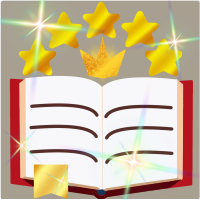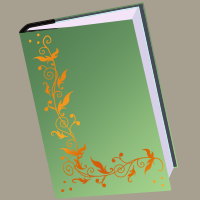Jun 21, 2024
As this is the end of the rewrite, or at least the end of what I've read previously, and that the points relating to development have more or less been discussed previously, I think this soon-to-be long comment will just be me praising you a bit and expressing some remarks that will mainly focus on typos, repetitions and descriptions. I'm aware that you are sometimes struggling with the flow of words and repetitions - since it was something you mentioned few time ago - but it's precisely why I've chosen to delve a little deeper into this matter. As for why I'm telling you this rn rather than chapter/ chapter, I just thought it was more relevant to make a big point rather than spamming your comment section with every single repetition/ typo or "problem" with descriptions. In any case, I think I'll only quote a few here in order to illustrate what I'll mean.
Anyway, as I said previously, I'm glad that you've prioritized spicing up the content rather than taking some away - this allowing you among other things to add some suspense but more importantly to dwell a bit more on Lumière development/ accentuation of his personality -and you did well indeed. On that note, I think it was really well thought out to "switch" the focal of the narration in the first chapter from a psychological pov to a more general one. Thus, even though one still has a grasp of Lumière's vision of the world, the latter doesn't feel "too much" in that his scheming side "counterbalances" , if I may say, the whole. To an extent, it's simply nice to see that our mc is not solely reduced to "someone who hates the world".
Another really good point is that Lumière seems way more human, alive. Unless I'm wrong, I don't think that the " thought mechanism" was something you used a lot in faded scales or yhhm and that on the contrary, it's something you use a lot here, and that you've introduced a little more in the rewrite. I think it's a simple but effective mechanism in order to have a glimpse of his pov. To an extent, it also allowed you to "correct" his initial "lack of reaction" - so it's even more welcome.
Speaking of his reactions, I feel like the point here is not to say whether they're good or bad, but rather to say that they're fairly consistent with his personality and priorities. On the other hand, the constant warnings of approaching danger, the sensations of unease/ déjà vu allowed you to keep Lumière under pressure and make him more or less think/ reflect - which was again, well thought and interesting.
About the suspense,/ tension/ mystery , adding some through the character of Thomas was again, well thought out, as well as adding the two little boys from the monastery - which sort of accentuated the tragedy of the massacre.
More generally, the whole plot in these chapters seems smoother and less forced - especially concerning the confrontation of Lumière's pov and that of the others, which seems more natural. Having in mind what your "goals" regarding the rewrite were or how you wanted to portray the beginning, I think you pretty well managed to achieve them all : points that needed to be more explicit are indeed more explicit, dynamics as well as the world building seem more clear and understandable - so I can only say well done and hope that you are also satisfied and proud of the result ^^
That being said, it's time for the remarks, from the more to the less relevant.
About the little typos :
- chapter 5 about the part regarding the starvation of the dwindlers : " the constant struggr' , i think you meant struggle
- chapter 6, in the beginning of the encounter with the rat man : 'the placed a hand" , you probably omitted the word "man'
- chapter 10 : "Teight-dozen", superfluous T
- chapter 17 : " Instead of just losing consciousness, it seemed like he was also losing his lucidity instead', unless I'm mistaken, superfluous 'instead' at the end.
About the repetitions:
Whilst they are a good way to emphasize certain elements and bring more impact, or simply an interesting stylistic choice, repetitions can be what narrows your « descriptive potential » and, a fortiori, tarnishes both your beautiful prose and well-thought plot, if overused.
Distinction needs to be made between the "redundant" , occurring when reference is made to Lumière/ Father Benedict, and the "rare" ones, made on a more "descriptive" purpose, if I may say.
"Lumière opened the door to his room, shutting it behind him and sighing. After stepping inside his room, Lumière immediately noticed the chill that bit at his skin. The window to Lumière’s room was open" ( chap 9 ), "Lumière smiled warmly. Of course, Lumière didn’t bother to glance towards the far end of the hall, where Father Benedict’s room was. " ( chap 9 ), these sentences ( for instance ), to me, have a common thread : the repetition of our mc’s name, or in other words the rather close vicinity between "Lumière" employment - which is a pity knowing the rich panel of references regarding him " at your service" such as the career liar, magician, illusionist, chestnut-haired boy, or simply he. A panel you can employ since you already indicated in the first place that Lumière was the subject, if i have to explain it roughly.
For instance, lets take:
- this part : "Lumière smiled warmly. Of course, Lumière didn’t bother to glance towards the far end of the hall, where Father Benedict’s room was." Since you mentioned that Lumière was smiling, using his name again seems rather superfluous, and tends to "cut" the pace, making it fitful. Instead, simply using his pronouns to smooth the whole => "Lumière smiled warmly. Of course, HE didn’t bother to glance towards the far end of the hall, where Father Benedict’s room was."
- and this sentence ( chap 12 ) : Father Benedict and Sister Alinde looked at Lumière with faces full of surprise, but their elations nor their questions rang out to be soothed, as Lumière immediately adjourned to walk back to the monastery. => Father Benedict and Sister Alinde looked at Lumière with faces full of surprise, but their elations nor their questions rang out to be soothed, as HE immediately adjourned to walk back to the monastery.
On the other hand, I think that repetitions also occurred because you put in two sentences what you could’ve simply put in one - Lumière being both their subject, his actions being rather simultaneous - , which made the description somewhat "cluttered". I'll come back to it later. Here, the point is perhaps to create a "smoother" connection between the two if possible either thanks to logical connectors, conjunctions or by simply "merging" the two propositions together through punctuation. To an extent, how sentences will merge together will strongly depend on how much impact you wanna give to them or simply how you wanna depict the information they contain.
Using the same part as a matter of fact, "Lumière smiled warmly. Of course, Lumière didn’t bother to glance towards the far end of the hall, where Father Benedict’s room was. He already knew that the Father was still awake, likely sifting through countless stacks of paperwork that were required of him by the main Cathedral in the middle borough."
Lets break it down briefly : Lumière is smiling and not glancing at the Father's room BECAUSE he knows THE LATTER ( this word is also important but more in terms of repetition, since you mentioned that it was "the Father Benedict's room", using "Father" again seems superfluous or a bit repetitive ) is still awake bc of work. "Because" basically embodies the "link" between the last 2 sentences,and how you choose to "link" them will influence how the 2 will be perceived.
Here, the point was to tell/emphasize that Father Benedict was working late, so rather than using a "." that seems to cut the pace, why not use a ":" ? If the point wasn't to emphasize it as much, then " for/because" or present participle ( knowing ), is a good way to both link and smooth the whole.
=> Lumière smiled warmly. Of course, HE didn’t bother to glance towards the far end of the hall, where Father Benedict’s room was, [ FOR/: he knew] / [ KNOWING ] that [ THE LATTER ] / [AINSWORTH] was still awake, likely sifting through countless stacks of paperwork required of him by the main Cathedral in the middle borough.
As for the repetitions used for a more "descriptive" purpose, I think the problem is the same: most of the time, these appear when you describe the same action twice in a row when a certain action relates to the same thing/place, or simply when the mention of certain actions seems "superfluous" and, while relevant in isolation, clutters up the narrative.
Lets take this sentence , "Lumière opened the door to his room, shutting it behind him and sighing. After stepping inside his room, Lumière immediately noticed the chill that bit at his skin. The window to Lumière’s room was open, letting the midnight air seep in."
Firstly, besides the "Lumière" and "room" repetitions 3 times in a row ;-; , what is happening ? While entering his room our mc noticed that its window was open, which likely implied that someone had snuck in.
Since you've already set the scene by saying that Lumière was entering his room, was it really necessary to specify later that he was walking inside "Lumière's room" and that it was "Lumière's room window" that was open ? Similarly, in the first sentence, our mc opens his bedroom door, closes it and sighs. In essence, there's nothing wrong with that, just that the way it's portrayed somehow comes across as robotic, whereas the latter is rather simultaneous. So why not take some advantage of it? 1/2
![]()



